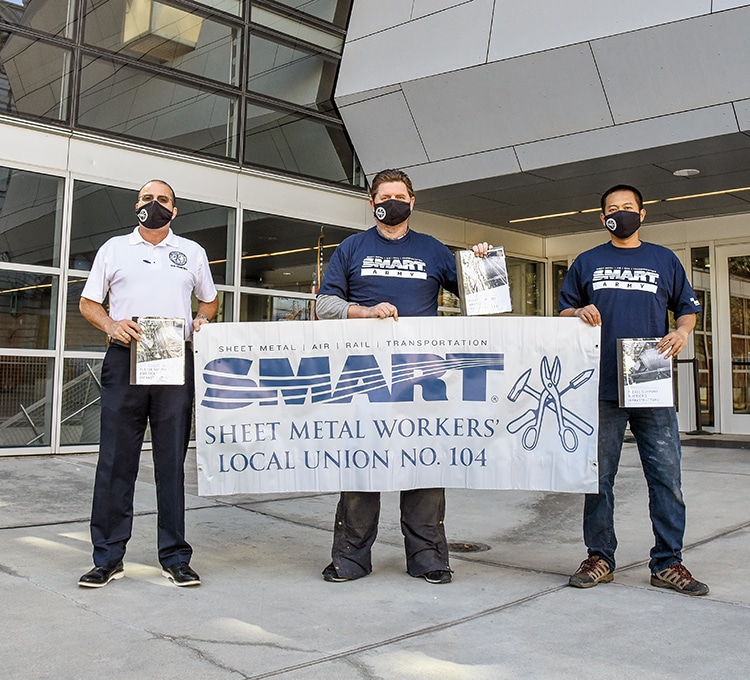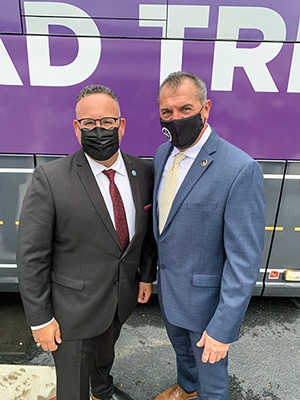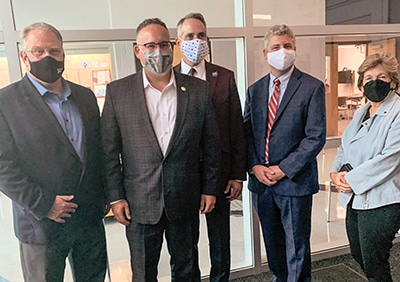
At the same time, SMART is working on making sure Congress gets this package right. That’s why it is essential that Congress passes the bipartisan infrastructure deal and reconciliation package together and that both contain strong labor and worker protections.
If and when it is passed, it will represent the largest infrastructure investment in almost a century, with the potential to create a generation of good-paying union jobs.
This means any project receiving federal support complies with a base of labor standards that include prevailing wage, registered apprentices, the elimination of misclassification and wage theft, and neutrality agreements so that workers are given a fair choice to form or join a union.
The package includes local hire provisions, so wages stay local, and robust funding for school construction, so schools can improve and update indoor air quality and put thousands of SMART members to work.
President Biden proposed $100 billion for school construction and, as of now, that number is fluctuating during negotiations.
Additionally, the House reconciliation package includes rail and transit safety provisions that will keep Amtrak and transit operations fully funded while providing a jumping-off point to enhance safety for America’s railroaders.
See Below For Highlights of Currently Proposed Legislation That Will Have A Direct Impact On SMART Members
HIGHLIGHTS OF CURRENT STATE OF BUDGET RECONCILIATION:
(as of Oct. 25, 2021)
- Over $180 billion in clean energy tax credits, with a bonus tax credit for paying prevailing wages & using registered apprentices.
- New $4,500 tax credit for union-made electric vehicles built in the United States.
- New $500 tax credit for batteries manufactured in the United States.
- Some of the most significant labor reforms since the New Deal have the potential for being passed in this bill. This includes new civil monetary penalties for existing unfair labor practices committed by employers during union organizing campaigns. The penalties are a dramatic step up from current sanctions and reach $50,000-$100,000 per violation.
- New civil monetary penalties for new unfair labor practices, which include the holding of captive audience meetings, striker replacements, mis classification, lockouts and compulsory arbitration with fines of $50,000-$100,000 per violation.
- For the first time, sanctions can be made against individual corporate officers, so directors and company CEOs can be personally liable. For example, if a director knew about an unfair labor practice and didn’t do anything about it, he or she could be held personally liable with significant penalties.
- In 2017, the Trump administration removed the tax deduction for union dues. In this bill, that deduction is restored with a $250 cap.
- Currently, $82 billion for school construction and modernization is included in this bill.
- An additional $74 billion is included for job training that includes the expansion of registered apprenticeships and funds new workforce training programs to fight climate change.
- For the first time ever, Universal Paid Leave is included, with up to 12 weeks, along with a $3,000 per child tax credit extended to 2025. This is in addition to universal pre-K for 3- and 4-year-olds, as well as two years of free community college.
- Over $15 billion is included in this bill to build childcare centers, which includes work for energy retrofits and HVAC systems that will put union sheet metal workers to work.
- There is a $50 billion increase in affordable housing, which includes building energy retrofits & HVAC systems to put members to work.
HIGHLIGHTS OF CURRENT BIPARTISAN INFRASTRUCTURE LEGISLATION FOR SMART:
(as of Oct. 25, 2021)
- $550 billion over current spending on basic infrastructure, which is mainly focused on building roads, bridges, airports, electric vehicle charging stations, drinking water, transit, rail/Amtrak and power grid modernization.
- The bipartisan infrastructure bill includes $250 million to be used for an energy efficiency revolving loan fund, which can be spent on indoor air quality.
- $50 million for an energy efficiency pilot program for nonprofit buildings to conduct energy efficiency upgrades, including HVAC systems.
- $500 million for school energy efficiency that can be used to upgrade ventilation.
- $6 billion for Northeast Corridor grants, along with an additional $16 billion for the national rail network.
- $36 billion for the Federal-State Partnership for Intercity Passenger Rail, with $24 billion set aside for the Northeast Corridor.
- $5 billion for the Consolidated Rail Infrastructure and Safety Improvement (CRISI) grant program.
- $3 billion for the Railroad Crossing Elimination Program.
- $50 million for restoration and enhancement of the current rail system.
- New stipulation that prohibits contracting out work if current employees who can perform that work are currently furloughed, as well as new requirement that requires Amtrak to staff station agent positions at stations that receive certain levels of traffic.
- New rules requiring that Amtrak and commuter rail employees who are victims of assault must now be covered by critical incident stress plans and the benefits and protections provided by such plans.
- To avoid reduction in operating service, a new rule is included that increases the difficulty for Congress to eliminate a long distance route.
- An additional $74 billion is included for job training that includes the expansion of registered apprenticeships and funds new workforce training programs to fight climate change.
- For the first time ever, Universal Paid Leave is included, with up to 12 weeks, along with a $3,000 per child tax credit extended to 2025. This is in addition to universal pre-K for 3- and 4-year-olds, as well as two years of free community college.
- Over $15 billion is included in this bill to build childcare centers, which includes work for energy retrofits and HVAC systems that will put union sheet metal workers to work.
- The bill requires a National Academies study on the safety of trains longer than 7,500 feet, as well as the requirement that FRA incident reports include information on train length, the number of cars and the size of the crew on board. The DOT must also create a process to better involve stakeholders, including rail labor representatives, in its investigations.
- Finally, a new rule requires a quarterly report on failures and functions of Positive Train Control technology.
SMART members lead in push for infrastructure
Related News
- Razor blade found on brake wheel
- Coming Soon: SMART-TD Voluntary Income & Life Protection (VILP) Program
- NIH funding cuts contribute to lost work hours for San Diego sheet metal workers
- Senate Passes Tax Bill Without Including Railroaders
- Canada Day 2025: General President Coleman’s message to members
- SMART-TD Honors the Retirement of Brother Greg Hynes: A Visionary, a Fighter, and a Legend
- SMART-TD Calls on U.S. Senate to Support the Cantwell Amendment and Protect Rail Workers
- Yardmaster Protection Act Introduced
- PHOTO GALLERY: 2025 Denver Regional Training Seminar
- Fighting for Stronger Heat Protections for Rail Workers

